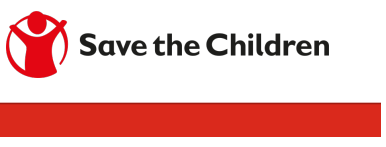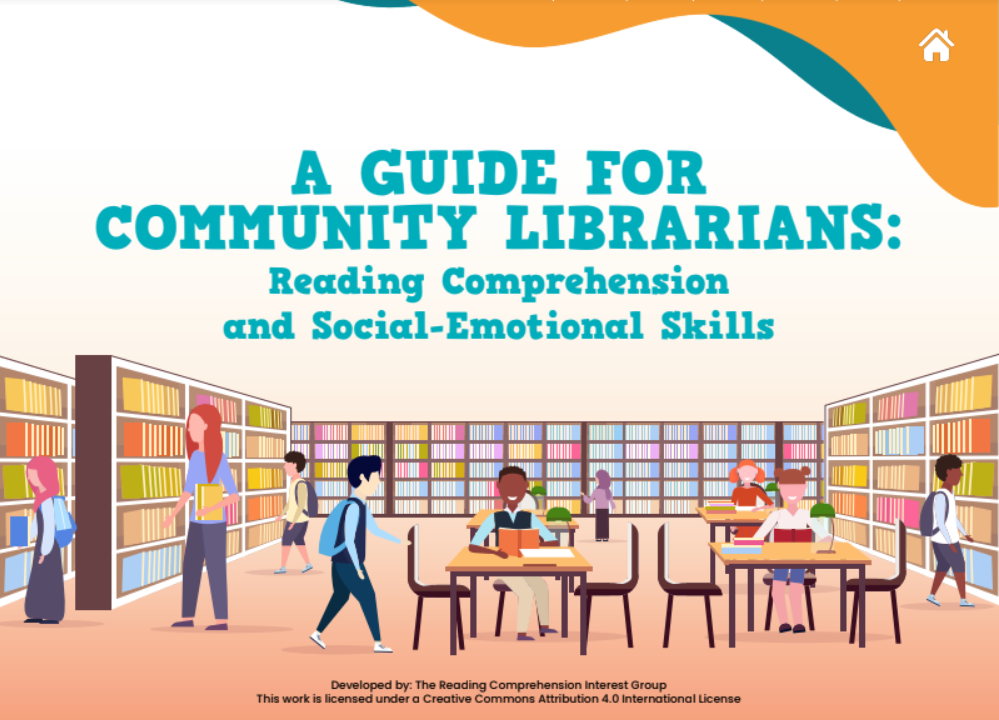In Rwanda, Save the Children collaborated with education ministries, publishing industry stakeholders, schools, book sellers and libraries in order to strengthen existing systems and increase output and availability of quality local language children’s books. This ‘whole chain’ approach addresses every step of a book’s journey from authorship to child and emphasizes the need for sustainable, profitable industries which will guarantee availability of local-language, contextually relevant reading materials to support a culture of reading in the long term.
A Guide for Community Librarians: Reading Comprehension and Social Emotional Skills
Developed by the Reading Comprehension Interest Group, this innovative guide is crafted to address the crucial need for enhancing children's engagement in reading and Social Emotional Learning (SEL) practices. It serves as a comprehensive toolkit aimed at empowering teachers, librarians, and community leaders to foster literacy and SEL skills in children through the nurturing environment of community libraries.
Book Supply Chain Analysis: Nigeria
The Nigeria Book Supply Chain Analysis was commissioned to inform the work of the GBA as well as that of USAID Nigeria, the Nigeria Federal Ministry of Education, and other key development partners. The analysis was conducted in 2022 and focuses on the states of Adamawa, Sokoto, and Ebonyi and the cities of Ibadan and Abuja. The Nigeria SCA Addendum presents Market Analysis Book Survey (MABS) and Market Analysis Focus Group Discussion (MAFGD) reports that probe deeper into the status of essential reading books in the Nigerian education system.
Book Supply Chain Analysis: Grenada
Book Supply Chain Analysis: St. Lucia
Book Supply Chain Analysis: Dominica
Book Supply Chain Analysis: Zambia
Book Supply Chain Analysis: Malawi
Book Supply Chain Analysis: Jordan
Book Supply Chain Analysis: Cambodia
Publishing in Africa: Where are we now? An update for 2019
Hans Zell, 2019
Publishing in Africa: Where are we now? An update for 2019.
This research seeks to provide a broad round-up of the current situation of the book industry in Africa today (primarily that in English-speaking sub-Saharan Africa), together with a brief review of the work and activities of the various organizations and associations that have been supportive of African publishing over the years.
The Scramble for Textbooks in Tanzania
Sonia Languille, 2015
The Scramble for Textbooks in Tanzania
In 2014, the Chama Cha Mapinduzi (CCM) government in Tanzania decided to discontinue the market-based system for textbook provision that was established in the early 1990s and revert to full state control Drawing on the theory of political settlements and the literature on Tanzania’s industrial politics, the article examines the political economy of textbook provision in this country in order to generate new insights into the relations between the educational, political, and economic spheres. It shows how donor ideology and practices, while subjecting textbooks to generic market principles, also promoted the interests of Western publishing corporations. It then argues that the distribution of power within the state, and the ambiguous relations between the CCM ruling elites, bureaucrats, and the capitalist class, prevented the consolidation of a textbook industrial policy geared towards supporting the local publishing industry. Finally, the article explores elites’ diverse corrupt practices to capture public funding for textbooks at the national and local levels. Under Tanzania’s country-specific political settlement, the textbook sector, far from primarily serving educational goals, has indeed been reduced to a vast site of primitive accumulation.
Interventions in Book Provision: Suffocating Education and the Local Book Industry the Case of Tanzania.
Abdullah Saiwaad, 2017
Interventions in Book Provision: Suffocating Education and the Local Book Industry the Case of Tanzania.
”In Tanzania it is evident that the book sector has not been developing at a pace commensurate with the growth of the population and the other economic sector in the country. Indeed there are indications that the sector as a whole has been in steady decline since the early seventies, began picking up in the years from 1993 to 2013 and is now quickly declining into the pre 1993 era. The reasons for this are many and cut across socio-political and economic factors. The collapse of the economy since the late 1970s is one such factor. The lack of a developed publishing, printing and book distribution infrastructure at the time of independence is another. The low level of educational and linguistic attainment among Tanzanians is yet another contributory factor.”
The Education We Want
HakiElimu, 2021
The Education We Want: A Critical Analysis of the Education and Training Policy (ETP) 2014, Issues, and Recommendations
The report offers insights into the kind of education required to prepare citizens to cope with the demands of the 21st Century and the complexity of the world. It identifies policy issues in 21 key domains covering a full spectrum of education provision. It makes several recommendations for an approach of education we want, based on the local reality of education in Tanzania, international experiences, and best practice from the high-performing education system of similar and different economic, political and educational contexts.
Association between availability of children’s book and the literacy-numeracy skills of children aged 36 to 59 months
Alexander Manu, Fernanda Ewerling, Aluisio JD Barros, Cesar G Victora, 2019
Association between availability of children’s book and the literacy-numeracy skills of children aged 36 to 59 months: secondary analysis of the UNICEF Multiple-Indicator Cluster Surveys covering 35 countries
Stimulating home environments that have children’s books, pictures and play toys facilitate caregiver-child interactions and enhance children’s development. Although this has been demonstrated in small-scale intervention studies, it is important to document whether book ownership is beneficial at large scale in low and middle-income settings.
Only half (51.8%) of children from all the countries analysed have at least one children’s book at home and less than one-third (29.9%; 95% confidence interval (CI) = 23.5%, 36.3%) are on track for literacy-numeracy. After adjusting for confounders, the likelihood of being on track in literacy-numeracy almost doubled if at least one book was available at home compared to when there was none: RR = 1.89 (95% CI = 1.75, 2.03). There was an economic gradient showing that the likelihood of children being on track for LNI decreased with the country’s income group: adjusted-RR ranged from 1.65 in upper middle income to 2.23 in LIC (F-test P-value <0.0001). Only three high-income countries were included, and children’s books were universally available resulting in wide confidence intervals for the effect.
These findings are policy-relevant, as they corroborate the results from small scale experiments. Making children’s book available to children is a cheap and feasible intervention that could change home dynamics to improve the future economic fortunes of children especially in the poorest countries.
Embedding Track and Trace in Book Supply Chains, El Salvador
World Bank, 2022
Read@Home - Embedding Track and Trace in Book Supply Chains : Final Country Report - El Salvador
The Read@Home Track and Trace to Strengthen Book Supply Chains project involved the creation of a best practices guide to implementing track and trace solutions for Teaching and Learning Materials (TLM). Support was also provided to five target countries to adapt these best practices to the country context to enable the development of robust, locally-owned supply chain monitoring systems to ensure delivery of TLM to the schools and families that need them most.
Embedding Track and Trace in Book Supply Chains Track and Trace : Design Document - Niger
World Bank, 2022
Read@Home - Embedding Track and Trace in Book Supply Chains Track and Trace : Design Document - Niger
This system design document was compiled following workshops with key national stakeholders followed by subsequent key informant interviews and data collection. Expansive data collection and follow-on design and validation workshops were organized for those countries where it was possible. This design sets out the expected functionality of the technology to be used to improve the monitoring of the textbook distribution chain.
Embedding Track and Trace in Book Supply Chains : Design Document - El Salvador
World Bank, 2022
Read@Home - Embedding Track and Trace in Book Supply Chains : Design Document - El Salvador
This system design document was compiled following workshops with key national stakeholders followed by subsequent key informant interviews and data collection. Expansive data collection and follow-on design and validation workshops were organized for those countries where it was possible. This design sets out the expected functionality of the technology to be used to improve the monitoring of the textbook distribution chain.
Embedding Track and Trace in Book Supply Chains : Final Country Report - Niger
World Bank, 2022
Read@Home - Embedding Track and Trace in Book Supply Chains: Final Country Report - Niger
The availability of quality textbooks is a basic requirement to enable children to learn, yet many countries are unable to ensure their young students have reliable access to these resources. Country supply chains often struggle to keep schools well supplied with learning materials, particularly in the hardest-to-reach places. Further, many children are unable to attend school at all, thereby missing out on many of the educational opportunities and programs that would otherwise be available to them. The current COVID-19 pandemic has only exacerbated these problems, as many children that would otherwise be in school are unable to access remote learning. The World Bank, through the Read@Home initiative, seeks to address these challenges by working with local education and supply systems to develop appropriate materials for home learning and deliver these materials directly to the families that need them, leveraging monitoring systems to ensure books are reaching students. In recent years, several textbook distribution and track and trace systems have been piloted to assist local supply systems in ensuring that education materials reach schools at the last mile. Through the World Bank-funded Read@Home: Embedding Track and Trace in Book Supply Chains initiative, John Snow, Inc. (JSI) and subcontractor World Education, Inc. (WEI), built on this global knowledge base by identifying a set of best practices in textbook delivery monitoring in low and middle-income countries. At the same time, the World Bank understands that context is vital in ensuring a successful supply chain monitoring system, so these best practices will have to be easily adaptable to different situations. To this note, JSI/WEI supported five target countries (Cameroon, El Salvador, Sudan, Niger, and Senegal) in understanding these best practices and adapting them to their own contexts by developing locally owned supply chain monitoring systems to ensure delivery of textbooks to the schools supporting children from families that need them most.
Embedding Track and Trace in Book Supply Chains - Cameroon
World Bank, 2022
Embedding Track and Trace in Book Supply Chains : Final Country Report - Cameroon
The Read@Home Track and Trace to Strengthen Book Supply Chains project involved the creation of a best practices guide to implementing track and trace solutions for Teaching and Learning Materials (TLM). Support was also provided to five target countries to adapt these best practices to the country context to enable the development of robust, locally-owned supply chain monitoring systems to ensure delivery of TLM to the schools and families that need them most.












